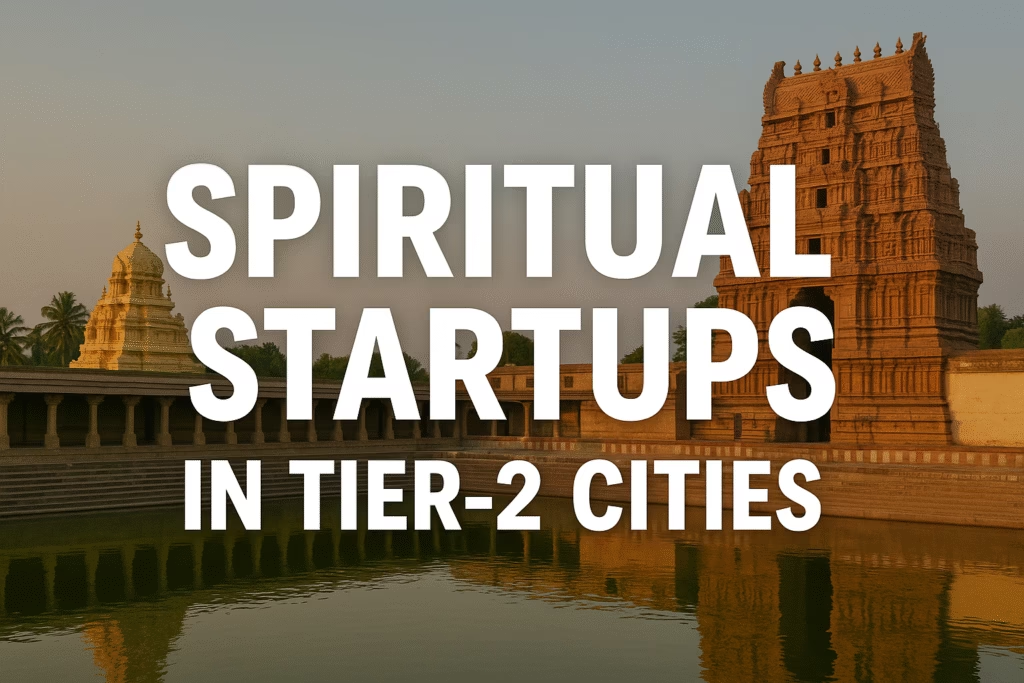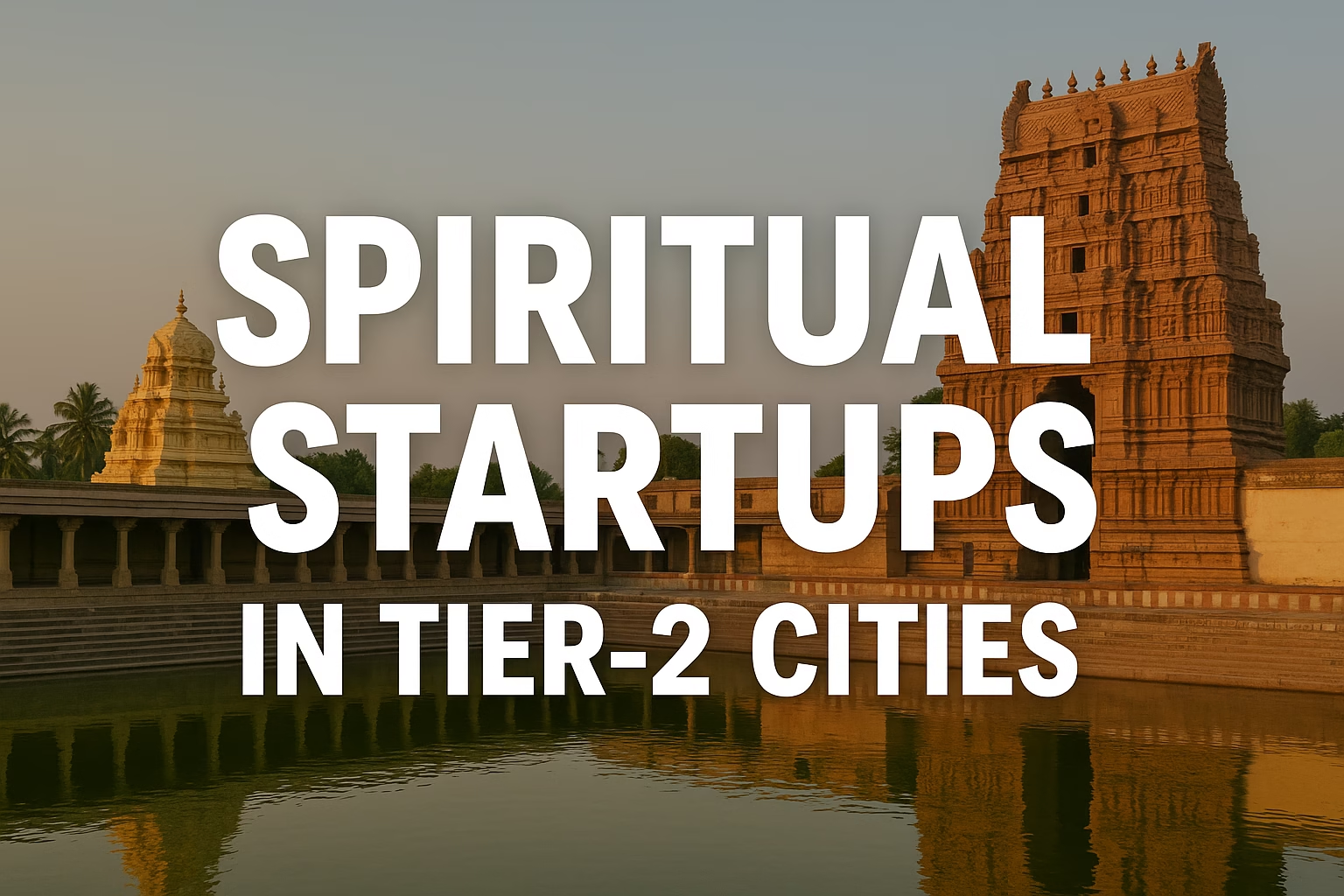Introduction: A New Kind of Startup Story

Move over fintech and food delivery — there’s a new wave of entrepreneurs rising from India’s Tier-2 cities, and their startups are powered by something timeless: faith.
From meditation apps to astrology platforms, temple logistics to online puja services, Spiritual Startups in Tier-2 cities are blending India’s deep-rooted spiritual traditions with the speed and scale of modern technology.
These ventures are not just profitable; they’re deeply personal — and they reflect a growing trend of homegrown innovation outside the metros.
What Are Spiritual Startups?
Spiritual Startups in Tier-2 cities are businesses that offer products or services rooted in India’s spiritual, religious, or wellness traditions — often combining digital platforms with ancient practices.
Some examples include:
- Apps for astrology, daily horoscopes, and kundali matching
- Online puja booking and live-streamed rituals from temples
- Yoga and meditation platforms tailored for Indian audiences
- Ayurvedic health consultations and remedies
- Spiritual travel and darshan logistics services
- Custom idol-making and eco-friendly religious supplies
And it’s not just happening in Bengaluru or Mumbai. The real action is now in Lucknow, Coimbatore, Indore, Varanasi, and Bhubaneswar — Tier-2 cities where spirituality is woven into everyday life.
Why Tier-2 Cities Are Leading This Wave
1. Cultural Proximity
In cities like Ujjain, Haridwar, or Ayodhya, spirituality isn’t a niche — it’s a way of life. Founders in these cities understand the mindset and rituals of their audience intimately.
2. Low Cost, High Creativity
Operating costs in Tier-2 cities are lower, allowing startups to experiment without massive funding. With just a few lakhs, one can launch a solid MVP (Minimum Viable Product).
3. Digital Boom in Bharat
With Jio and cheap smartphones, even smaller towns now have 4G access. Spiritual consumers — from homemakers to retirees — are online and looking for meaningful digital experiences.
4. Local Talent and Returnees
Many tech professionals have returned to their hometowns post-COVID. They’re building startups from Tier-2 cities with global tech and local insight — the perfect mix for spiritual startups in Tier-2 cities.
Real Examples: Faith Meets Innovation
🔮 AstroTalk (Lucknow-origin)
Now a top astrology platform in India, AstroTalk connects users to astrologers via chat or call. It started from a Tier-2 mindset, solving a very Indian problem: trust in pandits and personal guidance.
🕉️ MyPujaBox (Meerut)
An e-commerce platform for spiritual goods — from diyas to eco-friendly Ganeshas. It serves a modern audience that still values tradition but wants convenience.
🚩 OnlinePrasad (based in Varanasi)
Started by an IIT graduate, this startup delivers prasad from famous temples to devotees’ doorsteps. It taps into the emotion of faith while offering digital ease.
These are just a few of the many spiritual startups in Tier-2 cities changing the way Indians engage with spirituality.
Young Founders, Ancient Wisdom
Contrary to stereotypes, these ventures aren’t run by elderly gurus or purohits. Most founders are under 35 — engineers, designers, or marketers who saw a cultural gap and filled it with purpose-driven innovation.
They aren’t “selling religion.” They’re repackaging access to ancient wisdom for modern lives — something even global platforms struggle to do authentically.
As 28-year-old Vishal from Bhopal, founder of a local meditation app, puts it:
“People don’t want gyaan. They want peace. If we can give it through tech, why not?”
The Business of Belief: Market Size
The Indian spiritual and religious market is massive:
- Estimated at over $40 billion annually
- Includes pilgrimages, rituals, astrology, spiritual products, and wellness
- Largely unorganized, but rapidly moving online post-2020
This means spiritual startups in Tier-2 cities are tapping into a goldmine. Their local knowledge helps them create deeply resonant offerings — while tech helps scale them across India and abroad.
Challenges Along the Way
- Skepticism: Some see these startups as commercializing sacred practices.
- Lack of Funding: Spiritual tech doesn’t always attract VC interest like AI or fintech.
- Execution: Delivering spiritual services (like a pandit for a wedding) requires both tech and human coordination.
- Cultural Sensitivity: Missteps can offend sentiments — branding must be handled with respect and nuance.
Yet despite these challenges, the sector is thriving — because the demand is real and the emotional connection is unmatched.
The Future of Spiritual Startups in Tier-2 cities
Here’s what we can expect in the next few years:
- AI-powered puja recommendations based on planetary positions
- Virtual reality temple tours from your living room
- Blockchain-based donation systems for transparency
- Global expansion for NRIs who want spiritual services from India
- Hyper-personalized spiritual coaching through chatbots or mentors
And Tier-2 cities will continue to lead the charge — because they represent the soul of India.
Final Thoughts
In a country where gods and gadgets often sit side by side, it’s no surprise that spiritual startups in Tier-2 cities are flourishing. They offer a rare blend of cultural richness, digital innovation, and emotional relevance.
These startups don’t just chase profits — they chase purpose.
They don’t just create apps — they create connection.
And in a world full of noise, they help people listen to their inner voice.
The next unicorn might not be in edtech or fintech — it might just be a Spiritual Startups in Tier-2 cities you’ve never heard of.
📌 Stay Updated
Bookmark Time of Hindustan for more news.

